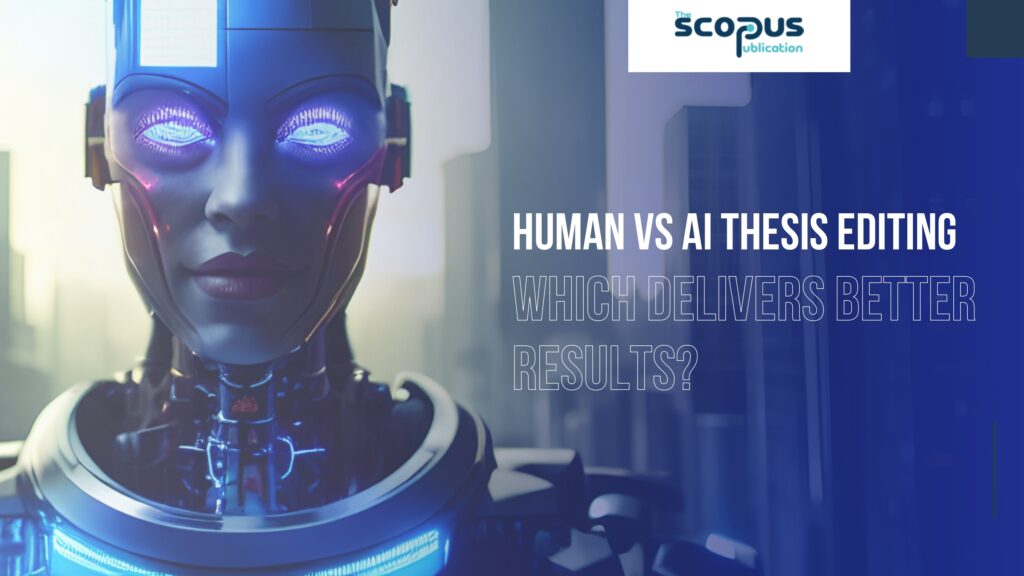For every learner or researcher, finishing a thesis marks an important milestone. However, the journey does not end at the last page. Polishing the work to be submitted or assisting in journal publication is thesis editing, and it is the most crucial of all steps. In this era of technology, students and researchers almost always find themselves in a common quandary: Which is better, human editors or AI editing programs?
Lets discuss both options, and hopefully, you will be able to make a conclusion on which performs better, especially when it comes to academic thesis editing and scientific proofreading.
Why is Thesis Editing Important?
After investing months of effort into a document, it is common to miss some detail towards the end like an inconsistency with elements such as punctuation, spelling errors or even formatting. Thesis editing makes sure your work is free from grammar mistakes, structural errors, awkward phrasing and formatting issues.
Furthermore, top-notch editing will make your argumentation more understandable. Make your writing easier to read, and ensure that your thesis will meet the specified academic standards. Meeting these borders is fundamental for researchers, especially those who plan to publish in journals, as a thesis that is well polished will drastically improve acceptance odds.
Human Thesis Editors: Expertise and Accuracy
The Value of Human Touch in Thesis Editing
Human editors have years of experience, and their academic background is coupled with the ability to think critically. They know the tone, style and formatting requirements of academic thesis editing. They can identify the inconsistencies in logic, strengthen arguments and make sure the manuscript flows smoothly.
Human editors also provide value through personalized feedback. They can help you understand how to make parts better, how to restructure paragraphs and how to improve your style of writing. This becomes particularly important for the case of scientific proofreading in which the technical aspects, the approach to research, and the presentation of data should be accurate and professionally tied.
When Human Editors Make the Difference
For complicated research works, scientific papers, and PhD theses, a human editor sometimes gives a better result because they are able to comprehend field specific language and can do contextual corrections. In addition, for students looking for journal publication assistance, human editors can give advice in accordance with the requirements for submitting an article to each journal, the guidelines for formatting, and editorial requirements.
AI-Powered Thesis Editing Tools: Fast but Limited
The Growing Role Of AI in Thesis Editing
AI-based applications have gained tremendous attention in the recent years. These applications employ artificial intelligence algorithms to recognize typos, errors, and even offer improved diction. For students, AI editors provide instant and inexpensive aid to trim their drafts and polish their documents.
AI-editing tools can scan your document and point out mistakes in a second, making them perfect for just-started thesis editing. They can also generate formatting recommendations, check sentence structure, and identify common writing errors.
The Shortcomings Of AI Editing Tools
AI tools do not lack shortcomings, though. Although they are able to correct grammar and spelling, they fail to comprehend complicated academic points and sophisticated writing, as well as specialized technical words. They cannot substitute human judgment when it comes to scientific proofreading or academic thesis editing which requires subject matter expertise.
AI tools are also incapable of offering personalized assistance in the publication of journals. They are not able to help you understand journal-specific requirements or peer review guidance cannot be interrupted or explained by AI tools.
Comparing Human And AI Thesis Editing: Which One Wins?
Although both human and AI editors have a vital role to play in thesis editing, both have strengths and weaknesses.
Human editors are very good at providing individual, field-specific edits as well as feedback concerning the general structure and argumentation. They become beneficial for scientific proofreading and helping authors in preparation for journal publication assistance. But human editors can also be costly and time consuming.
In contrast, AI tools are efficient, cheap, and convenient. They can be used on early drafts to pick fundamental errors and guarantee general readability. However, due to their lack of knowledge about academic writing and context, they should not be used exclusively as final submissions or when aiming at high-impact journals.
The Smartest Approach: Combine AI and Human Thesis Editing
As a way of getting the best, many researchers and students combine both options. The use of AI tools in the writing process helps you correct minor errors and refine the drafts. When your thesis is in good shape, hiring a human editor for academic thesis editing will guarantee that your work meets the highest standards for journal publication assistance.
This approach is also budget-friendly. AI tools can ease the amount of basic corrections that need to be made and thus enable human editors to concentrate on more complex corrections such as the flow of ideas, structure and scientific proofreading.
How to Select the Right Thesis Editing Opt?
When choosing between humans and AI editors, take into account the following considerations:
- The purpose of your thesis editing: If the document is intended for internal submission or preliminary feedback, AI might be enough. Nonetheless, for final submissions or journal publication assistance, human editing is best and recommended.
- The complexity of your thesis: For basic writing tasks, AI may suffice. Human editors are preferable for complex scientific documents, research-intensive theses, or when thorough scientific proofreading is required.
- Your budget and deadline: While an AI can perform the task cheaper and quicker, human editors, though requiring a greater investment of time and money, deliver accurate and more detailed results.
Final Considerations: Humans or AI?: Making the Correct Choice Regarding Your Thesis
In the modern academic environment that is highly dynamic, both human editing and AI offer distinct advantages. However, to achieve the best results, both should be integrated. At the initial stages of thesis editing, AI can assist with basic corrections, and later human editors will guarantee your thesis is polished and ready for scientific proofreading or help with journal publishing services.
For students and scholars wishing to publish in reputable journals, using AI tools is a dangerous strategy. The insights, interdisciplinary judgment, and — especially — the editing done on humans’ hands leverage deep knowledge that is truly necessary when it comes to academic thesis editing.
To achieve the desired result for your thesis, balance the use of both tools in a more tactical way. This approach saves the time and ensures the improvement of draft writing, while submitting a fully professional thesis, polished and ready for success in any academic or publishing phase.


